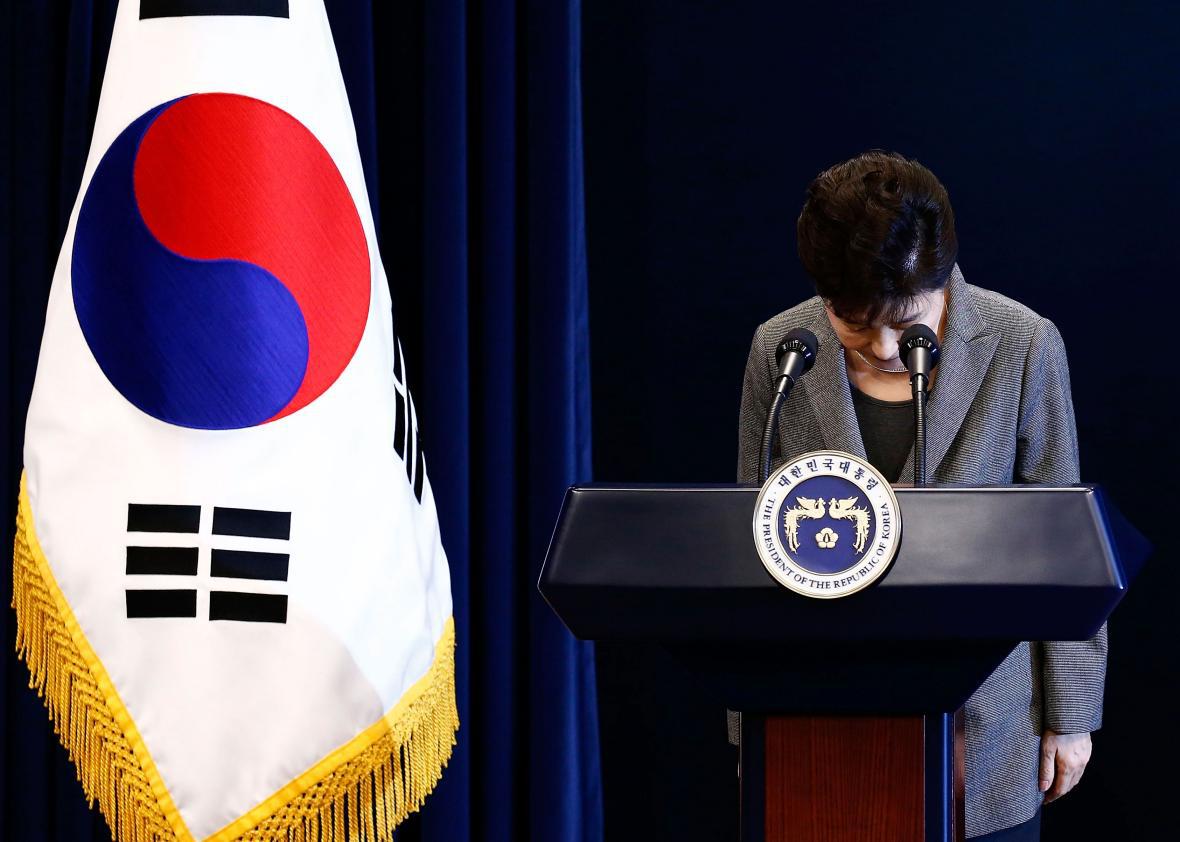South Korean President Park Geun-hye was impeached Friday after a baffling political scandal that brought millions of protesters out onto the streets over the influence that Park’s longtime friend and spiritual adviser allegedly had over the government. Park’s rapid fall has thrown the country’s political system into chaos at a moment when it’s facing an increasingly aggressive nuclear armed North Korea and when the election of Donald Trump in the United States has threatened to upend the traditional balance of power in East Asia.
Park isn’t out of the picture quite yet. For now, she still formally has the title of president and will continue to live in the Blue House, South Korea’s executive residence, and receive her salary. But her governing responsibilities will be turned over to Prime Minister Hwang Kyo-ahn, who has been one of her staunchest defenders. Her case—which involved accusations that the president’s longtime friend Choi Soon-sil, the daughter of a “spiritual adviser” who reportedly helped Park commune with her dead mother, was abusing her connection to the presidency—will head to the Constitutional Court, which has up to six months to rule on it. The last impeached president, Roh Moo-hyun in 2004, had his powers restored by the court, but Park’s odds are considered slim. If six of the nine justices approve of her removal, a new presidential election will be held 60 days after that.
So, if that happens, who’s likely to replace her? Hwang may try, but he may be too damaged by his association with Park, whose approval ratings had plunged to 4 percent in recent days. Another intriguing possibility is U.N. Secretary-General Ban Ki-moon, who steps down from his current position at the end of this year. It was thought that the onetime South Korean foreign minister was likely to run in the presidential elections that were previously scheduled for Dec. 20, 2017, for Park’s conservative Saenuri Party. Given the chaos that’s engulfed the party, he may now form his own faction—not unusual in South Korean politics. Reuters notes that Ban can’t start campaigning until the end of this month, so the sped-up timetable, especially if the court rules quickly, isn’t going to help him. But he’s still a popular figure untarnished by the recent ugliness in Seoul.
The other main front-runner is Moon Jae-in of the center-left Democratic Party, who lost to Park in 2012. There are also a host of longer shots including Lee Jae-myeong, the self-described “Bernie Sanders of South Korea,” who was one of the leaders of the anti-Park protests, and Seoul Mayor Park Won-soon, a former human rights lawyer. All would likely favor a less confrontational approach to North Korea and are critical of Park’s controversial plan to deploy a U.S. missile defense system, though it’s unclear if they would reverse it. (After the impeachment, the country was put on alert in case of any provocation from the North, though there’s been nothing so far. North Korea’s KCNA news agency hasn’t written anything about the impeachment yet.)
Whoever takes over will obviously be tasked with responding to a new administration in the United States, South Korea’s most important ally. Trump has already suggested through his phone call with the president of Taiwan last week that he may be willing to dramatically shift U.S. strategy in Asia. During the campaign, he said allies like South Korea should pay more for U.S. security guarantees and even suggested—though it’s not clear to what degree he meant it—that South Korea might be better off getting nuclear weapons of its own. Alarmingly, a growing number of South Korean voters agree.
It’s hard to draw too many sweeping conclusions from Park’s downfall. She is something of an anomalous figure to begin with. As Suki Kim recently wrote for Slate, the country’s first female president owed her rapid rise in large part to older voters nostalgic for the days when her military dictator father was in charge. While the occultism and hints of mind control and sexual impropriety made her scandal undeniably juicy, the actual crimes she’s accused of—allowing an old friend without security clearance to edit her speeches and enrich herself—are a bit mild compared with what many politicians routinely get away with. Park doesn’t even seem to have benefited personally from the improprieties that turned virtually the entire nation against her.
South Korea is going to be picking up the pieces for a while.
